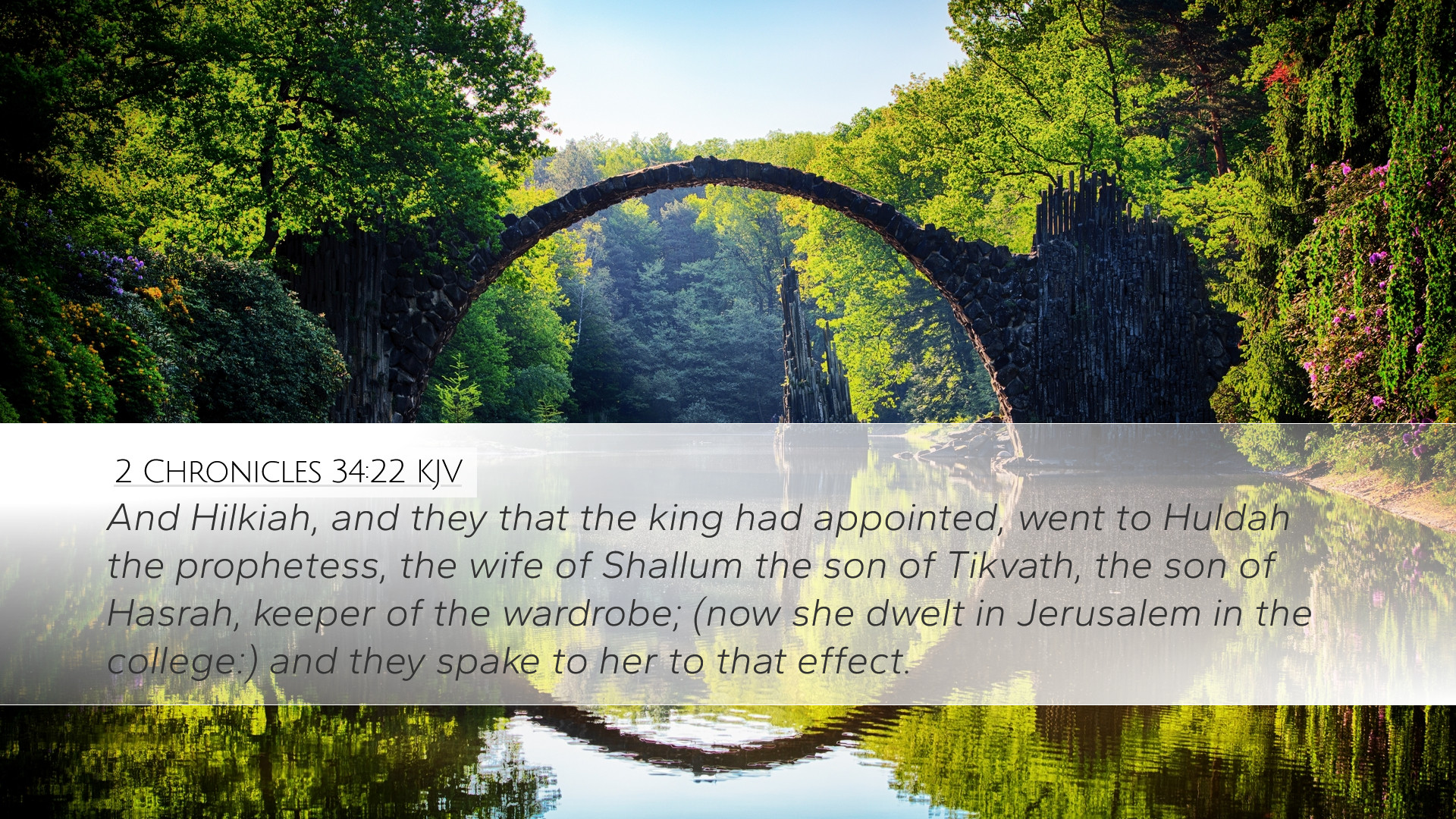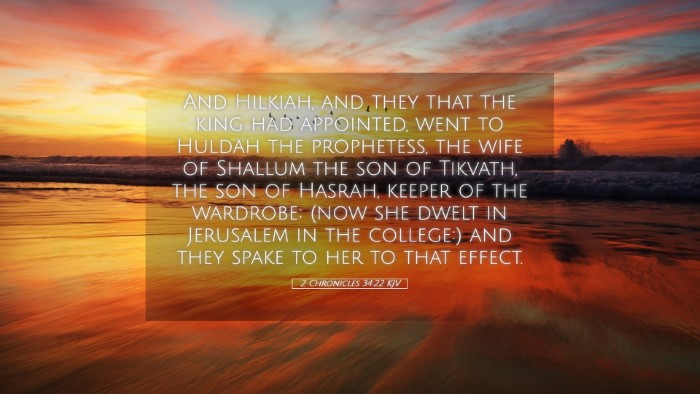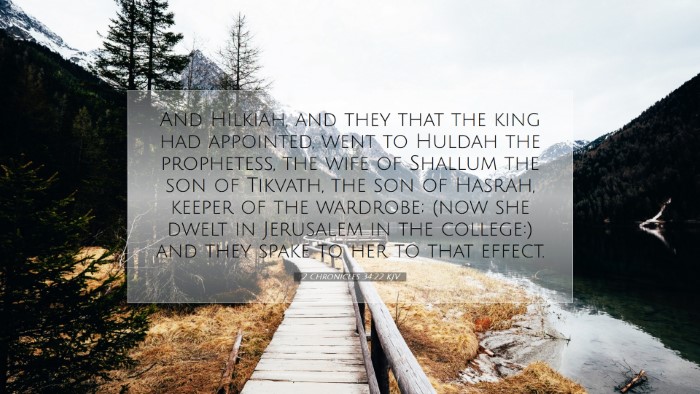Commentary on 2 Chronicles 34:22
2 Chronicles 34:22 states:
"And Hilkiah and they that the king had appointed went to Huldah the prophetess, the wife of Shallum the son ofTikvah, the son of Harhas, keeper of the wardrobe; (now she dwelt in Jerusalem in the college;) and they spake to her to that effect."
Contextual Overview
This passage occurs during the reign of King Josiah, a significant figure in Jewish history known for his reformative actions aimed at restoring the worship of Yahweh. This verse highlights the king's initiative to consult the prophetess Huldah, illustrating the importance of divine guidance in his efforts to lead the nation back to covenant faithfulness.
Insights from Public Domain Commentaries
Matthew Henry's Commentary
Matthew Henry provides a detailed exposition of the circumstances surrounding this event. He emphasizes the significance of divine revelation through the prophetess Huldah, noting that:
- The choice to consult a female prophetess reflects the spiritual condition of Jerusalem at that time. In a male-dominated society, Huldah was a divinely appointed messenger, showcasing God's inclusive nature in choosing prophets.
- Henry remarks on the king's humility and determination to seek guidance, contrasting with the pride and disobedience often seen in leadership. This act displays Josiah's recognition of the need for God’s voice amidst reform.
- The setting within the college signifies a place of learning, suggesting that Huldah was not only a spiritual leader but also an educated figure within the community, adding credibility to her prophetic role.
Albert Barnes' Notes on the Bible
Albert Barnes delves into several aspects of this verse:
- Barnes points out that Huldah's prophetic role provided a necessary counterbalance to the political actions of Josiah. His engagement with her is indicative of a king willing to acknowledge a higher authority and submit to divine counsel.
- He further explains the significance of Huldah's prophetic message, which was to confirm the truths found in the Book of the Law. This highlights the importance of scripture and prophetic affirmation in guiding Israel's national reforms.
- Barnes also notes the location where Huldah dwelled, suggesting it was a spiritual center which may have been frequented by those seeking wisdom, indicating the accessibility of God’s prophetic voice even amid national crises.
Adam Clarke's Commentary
Adam Clarke offers a comprehensive analysis of the characters and events at play in this passage:
- Clarke underscores that Huldah was not only the wife of Shallum but played a crucial role in preserving the covenant faith of Israel during a critical juncture in its history, highlighting the essential role women can play in God’s plan.
- He mentions the historical backdrop of the discovery of the Book of the Law in the temple, which initiated Josiah's reforms; thus, Huldah's prophecy is a confirmation that Josiah was on the right path.
- Clarke also emphasizes the motifs of repentance and renewal found in this passage, noting that the act of seeking counsel was an act of humility and sincerity in the pursuit of divine truth.
Theological Implications
The narrative of Josiah and Huldah's prophetic interaction invites several profound theological reflections:
- God's Inclusive Call: The passage exemplifies God's ability to choose instruments for His work irrespective of societal norms, as demonstrated by Huldah's authority as a prophetess, affirming that God's guidance transcends gender.
- The Importance of Seeking Divine Guidance: Josiah's decision to seek Huldah underscores the necessity of turning to God for wisdom and understanding, particularly during times of national or personal crisis.
- Scripture as Central to Spiritual Reform: The interaction between the king and the prophetess underscores the centrality of scripture in understanding God's desires and instructions for His people, highlighting the need for contemporary believers to value and engage with the Word of God.
Application for Modern Readers
For pastors, students, theologians, and scholars, this passage serves as a reminder of the following:
- The Need for Humility: Just as Josiah demonstrated humility in seeking out the prophetess Huldah, modern readers are encouraged to adopt a posture of humility in their spiritual leadership and decision-making processes.
- The Role of Women in Ministry: Huldah's story challenges traditional perceptions regarding female leadership and ministry roles, encouraging a reassessment of how the Church values and integrates the contributions of women.
- The Relevance of Scripture: The critical nature of engaging with the Bible as a source of truth and divine instruction is paramount, prompting pastors and believers to continually direct their congregations and personal lives back to God’s Word.
Conclusion
This commentary on 2 Chronicles 34:22 offers rich insights from respected public domain sources, reflecting on the importance of prophetic counsel, the significance of humility in leadership, and the overarching need for scripture in guiding faith and practice. Through the example of Josiah's interaction with Huldah, we are reminded of God's unfailing commitment to provide wisdom and direction to His people throughout history.


